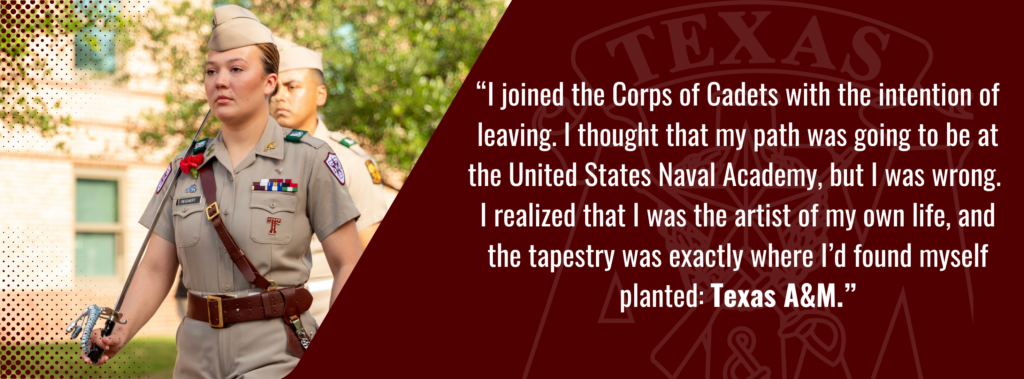
“I joined the Corps of Cadets with the intention of leaving. I thought that my path was going to be at the United States Naval Academy, but I was wrong. I realized that I was the artist of my own life, and the tapestry was exactly where I’d found myself planted: Texas A&M.”
A spring 2024 graduate of Texas A&M, Alexa Reichert spent her four years at the university as part of the oldest, largest and most visible student organization on campus: the Texas A&M Corps of Cadets. Beginning in Company A-1 and finishing her time in the Corps as the Third Battalion Commander, Reichert says that her growth as a leader within the organization was evident across all four years.
“I stayed because I knew there was something at A&M that I found as a cadet that I wouldn’t find anywhere else. When I was 18 years old I couldn’t explain it, but as a recent graduate, I can confidently say that the spirit of Aggieland is alive and well to those who seek it,” Reichert said.
“The leadership laboratory that the Corps provided me consisted of hard conversations and maturing in how I dealt with adversity. It was specifically through my leadership exercises in the Corps that I learned how to advocate for myself and help others accomplish a common goal,” Alexa continued.
Though heavily involved within the Corps, Reichert also found that her membership in the organization propelled her to reach new heights as a sociology major and as a member of the Texas A&M Gymnastics Team. Utilizing many different elements of the Corps experience, Reichert was able to push past her self perceived limitations and develop skills that have extended beyond her time in the organization.
“The Corps has prepared me as a leader by giving me opportunities to challenge myself and my mental, spiritual and physical abilities. Each lesson that I’ve learned in the Corps, even the hard ones, have been worth it in terms of how much I have grown. Whether it was utilizing the Corps specific academic advisors or working through injuries with the Corps physical trainers, I felt ready to break past the obstacles thrown my way, both on the Quad and off,” Reichert said.
“For me, the Hollingsworth Center in particular promoted leadership development on a very personal level. They always encouraged deep personal reflection and decision making that was genuine and swift, but also just. Being able to take classes with them helped me network and gain mentorship that I continue to lean on today. I was able to form my own leadership style and apply it during my time as a Commander in the Corps and also in my involvements outside of the organization,” she continued.
Post-graduation, Reichert now works for Texas A&M and the Corps of Cadets as an Corps Term Recruiter. Through this unique opportunity, Reichert will be embedded with Texas A&M’s Prospective Student Center in San Antonio, Texas. As a Corps Term Recruiter, Alexa will help prospective students learn more about the Corps of Cadets and the wide range of opportunities that are available to them as members of the organization.
“It is a privilege of mine to now serve as a recruiter for the Corps of Cadets. I am able to help people realize their potential for success that spans far beyond the classroom. The Corps develops leaders that will go on to serve those around them in a variety of ways, across many different endeavors. Being able to instill that sentiment in interested young men and women serves as a powerful reminder of what the Corps of Cadets offered me,” Alexa said.
